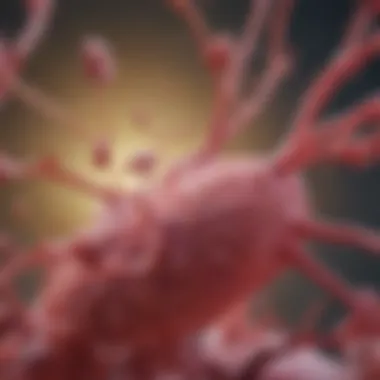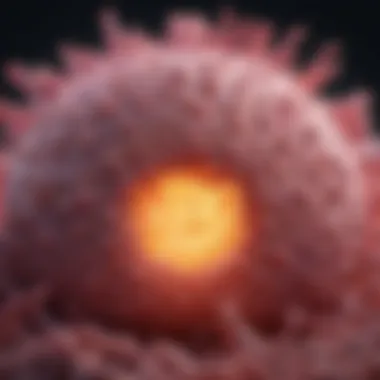The Role of Chek2 Gene in Cancer Research and Treatment


Intro
The Chek2 gene occupies a crucial position in the domain of cancer biology. It is known for its vital role in the DNA damage response and cellular checkpoint control. Mutations in this gene can lead to a range of malignancies, most notably breast and colorectal cancers. This article aims to dissect the multifaceted implications of Chek2 mutations, providing insights that are crucial for both ongoing research and clinical applications.
Article Overview
Summary of Key Findings
Recent studies have illuminated the relationship between Chek2 mutations and various cancer types. The gene encodes a protein that plays an essential role in maintaining genomic stability. When Chek2 is mutated, the risk of developing certain cancers significantly increases.
Key findings highlight the following:
- Breast cancer: Women with specific Chek2 mutations exhibit a heightened risk of developing breast cancer compared to the general population.
- Colorectal cancer: Chek2 mutations are also implicated in increasing the risk of colorectal cancers, often occurring in a familial setting.
- Other malignancies: Less frequently, Chek2 mutations have been associated with various other cancers, including prostate and thyroid cancers.
Research Objectives
The objectives of this article include:
- To explore the biological functions and mechanisms of Chek2 in tumorigenesis.
- To assess the implications of Chek2 mutations for targeted therapeutic strategies in oncology.
- To outline the future directions of research focusing on Chek2, thereby emphasizing its importance in personalized medicine.
Key Results and Discussions
Main Findings
The findings regarding Chek2 significantly contribute to our understanding of cancer genetics. The Chek2 protein serves as a key player in detecting and responding to DNA damage. When this pathway is compromised due to mutations, cells may undergo uncontrolled proliferation, leading to tumor formation.
According to recent research:
- Mutation prevalence: A considerable percentage of breast cancer cases exhibit heterozygous Chek2 mutations.
- Pathway interactions: Chek2 interacts with various proteins involved in DNA repair mechanisms, elucidating a complex web of molecular interactions essential for genomic integrity.
- Clinical implications: The identification of Chek2 mutations can influence screening and prevention strategies among individuals at risk.
Implications of Findings
The implications of Chek2 research are far-reaching. Understanding its role in cancer susceptibility can refine genetic testing protocols, enhancing early detection of breast and colorectal cancers. Moreover, these insights pave the way for the development of targeted therapies specific to patients carrying mutations in the Chek2 gene. The focus on personalizing treatment options signifies a shift towards precision medicine in oncology.
"The ongoing studies illustrate how insights into the Chek2 gene can enhance therapeutic strategies and improve patient outcomes."
The exploration of Chek2 not only sheds light on established cancer mechanisms but also opens avenues for further research. Future studies should aim to discover novel therapeutic targets that could emerge from understanding Chek2's biological pathways and its interplay in oncogenesis.
Prelims to Chek2 Gene
The Chek2 gene is crucial in understanding various cancers. It plays a central role in the DNA damage response, influencing how cells repair and regulate any damaged DNA. This section provides an overview of Chek2 and its importance in cancer research. Understanding this gene allows researchers and medical professionals to devise effective strategies against cancer.
Overview of Chek2
Chek2, or checkpoint kinase 2, is a tumor suppressor gene located on chromosome 22. It encodes a protein involved in cell cycle control and DNA repair. When DNA damage occurs, Chek2 is activated through a signaling cascade initiated by other proteins, such as ATM.
Chek2 is integral in maintaining genomic stability. Mutations in this gene can disrupt its functions, leading to unregulated cell growth. This situation can result in cancer development. Research continues to reveal the depth of its role in tumorigenesis.
Significance in Cancer Research
The significance of Chek2 in cancer research cannot be overstated. Here are some key points on why it matters:
- Genetic Risk: Variants of the Chek2 gene are linked with an increased risk for specific cancers, particularly breast and colorectal cancers.
- Pathway Understanding: Studying Chek2 provides insights into the DNA damage response pathways. This helps researchers comprehend how tumors evade these repair mechanisms.
- Potential therapies: As Chek2 is a target for cancer therapy, understanding its function might lead to targeted treatments for patients with Chek2 mutations.
- Personalized medicine: Identifying mutations in patients can help tailor screening and preventive strategies, enhancing patient management.


Research focusing on Chek2 continues to grow, reinforcing its relevance in oncology.
Research on Chek2 allows us to link genetic predispositions to clinical outcomes, paving the way for innovative and personalized treatment methods.
In summary, the Chek2 gene represents a vital component in the landscape of cancer biology. Grasping its significance can lead to revolutionary changes in diagnosis, treatment, and preventive measures.
Genetic Background of Chek2
The genetic background of the Chek2 gene is an important area to examine in any discourse regarding its role in cancer. Understanding the structure, function, and variability of the Chek2 gene can provide valuable insights into its significance in tumorigenesis. This section will focus on the gene's structure and the implications of its mutations and polymorphisms.
Structure of Chek2 Gene
The Chek2 gene is located on chromosome 22q12 and spans approximately 30 kb. This gene encodes a serine/threonine kinase that is a crucial component of the DNA damage response pathway. Its primary role is to phosphorylate proteins that are involved in cell cycle control, specifically during the G1/S and G2/M phases. The protein product of Chek2, known as checkpoint kinase 2, plays a vital role in maintaining genomic stability. It responds to DNA damage signals by activating various downstream signaling pathways, which ultimately leads to apoptosis or DNA repair.
Key features of the Chek2 gene's structure include:
- Kinase Domain: Central to its function, this domain is responsible for the phosphorylation actions on target proteins, contributing to cell cycle regulation.
- BRCA1 Interaction Domain: This domain facilitates interaction with the BRCA1 protein, linking Chek2 to breast cancer pathways.
- C-terminal region: This area is important for its regulatory functions and potentially provides targets for therapeutic intervention.
Mutations and Polymorphisms
Mutations and polymorphisms within the Chek2 gene have significant implications for cancer risk. Several studies have identified specific mutations that are associated with an increased likelihood of developing various malignancies, particularly breast and colorectal cancers. For instance, the mutation known as Chek2*1100delC, which leads to a truncated protein product, is frequently linked to breast cancer susceptibility. Such mutations disrupt the normal function of the Chek2 protein, compromising the cell's ability to respond effectively to DNA damage.
Polymorphisms, or variations that may not directly cause disease but can influence susceptibility, have also been investigated. Variants such as Chek2*634A/G have been suggested to modify cancer risk, although their effects can be subtle and context-dependent.
The main points regarding Chek2 mutations and polymorphisms include:
- Increased Cancer Risk: Certain mutations elevate the risk for distinct cancers, warranting genetic testing for at-risk patients.
- Pathway Interaction: Mutated Chek2 may alter interactions with other signaling pathways, influencing tumor progression and development.
- Personalized Medicine: Understanding one's Chek2 genetic makeup enhances risk assessment and may inform targeted treatment approaches in the future.
"Understanding the genetic implications of Chek2 mutations is key to developing preventative strategies and personalized treatment regimens in oncology."
Therefore, the genetic background of the Chek2 gene not only highlights fundamental mechanisms involved in cancer development but also sets the stage for further exploration of targeted cancer therapies.
Chek2 in the DNA Damage Response
The Chek2 gene plays an essential role in the DNA damage response, a critical pathway that maintains genomic stability. Understanding its function provides insight into how cellular mechanisms protect against cancer. Chek2 acts as a signaling protein that responds to DNA damage, ensuring that cells with compromised DNA do not divide uncontrollably. This protective role is vital for preventing tumorigenesis, making Chek2 a key factor in cancer research.
Role in Repair Mechanisms
Chek2 is involved in several repair mechanisms that rectify DNA damage. When DNA is damaged, Chek2 is activated, leading to a cascade of responses. One notable pathway is the phosphorylation of p53, a well-known tumor suppressor. Once activated, p53 can induce cell cycle arrest, allowing time for repair. This is critical because if the damage goes unrepaired, it may lead to mutations and cancer.
- Chek2 activates other proteins involved in the repair process, like BRCA1.
- It helps in the homologous recombination repair pathway, a precise mechanism for error-free repair.
These processes showcase how Chek2 contributes to cellular integrity. Its deficiency can impair these repair responses, increasing susceptibility to mutations.
Cell Cycle Regulation
In addition to DNA repair, Chek2 plays a pivotal role in regulating the cell cycle. Its activation leads to the halting of the cell cycle during the G1/S and G2/M checkpoints. This regulation is crucial; if the cell attempts to divide with damaged DNA, it can lead to further genetic instability.
Chek2 monitors critical cues:
- DNA integrity
- Availability of necessary repair mechanisms
By assessing these factors, Chek2 can ensure that the cell only proceeds to division when it is safe to do so. Failure in this regulation due to Chek2 mutations can result in uncontrolled cell proliferation, further augmenting the risk of various cancers.


"The Chek2 gene serves as a crucial checkpoint in the cell cycle, preventing the replication of damaged DNA, which is vital to cancer prevention."
The interplay of Chek2 in DNA damage recognition, repair, and cell cycle regulation highlights its importance in cancer biology. As research continues, the exploration of Chek2’s functions may provide new avenues for therapeutic interventions.
Association of Chek2 with Cancer Types
The Chek2 gene plays a crucial role in understanding the mechanisms behind various cancers. Its association with specific cancer types underscores the significance of genetic factors in tumorigenesis. Specifically, Chek2 mutations have garnered attention for their contributions to breast cancer and colorectal cancer. These associations provide insight into not only the etiology of these malignancies but also potential pathways for targeted interventions. The exploration of Chek2's role in different cancers broadens our understanding of cancer risks and informs clinical practices.
Breast Cancer
Breast cancer is one of the most prominent areas of research involving Chek2. Studies have shown that certain mutations in the Chek2 gene can increase the risk of developing breast cancer. These mutations may lead to a defective DNA damage response, impairing the body's ability to repair broken DNA strands. This inadequate response can cause genomic instability, which is a hallmark of cancer development.
Some key points to consider include:
- The association of Chek2 mutations with familial breast cancer cases.
- The potential for genetic testing to identify individuals at heightened risk.
- Strategies for risk reduction in carriers of Chek2 mutations, such as enhanced surveillance and preventive surgery.
"The Chek2 gene's involvement in breast cancer emphasizes the need for genetic counseling for at-risk individuals."
Colorectal Cancer
Colorectal cancer also exhibits a strong link to Chek2 mutations. Research suggests that individuals with specific Chek2 alterations have a higher susceptibility to developing this type of cancer. The relationship between Chek2 and colorectal cancer involves similar mechanisms of impaired DNA repair and genomic integrity.
Factors influencing this association include:
- The role of Chek2 in the DNA damage response, critical for maintaining cellular health.
- The identification of mutations that contribute to colorectal tumorigenesis and their implications for screening.
- The potential for integrating Chek2 mutation analysis in screening protocols for colorectal cancer.
Other Malignancies
Beyond breast and colorectal cancers, the Chek2 gene has been implicated in various other malignancies. Studies have hinted at associations with prostate cancer, pancreatic cancer, and renal cell carcinoma. These connections showcase the broader relevance of Chek2 in oncology.
Important points include:
- The involvement of Chek2 in multiple pathways that can lead to different cancer types.
- The need for comprehensive genetic assessments for effective cancer risk management.
- Future research directions focusing on the impact of Chek2 across diverse cancer contexts.
In summary, the association of Chek2 with multiple cancer types highlights its significance in cancer biology. Understanding these associations not only furthers scientific knowledge but also potentially enhances clinical strategies aimed at prevention and treatment.
Mechanisms of Tumorigenesis
Understanding the mechanisms of tumorigenesis is crucial in comprehending how the Chek2 gene influences cancer. The role of Chek2 is not limited to its function in DNA repair but extends to how its deficiency leads to disrupted cellular processes. This understanding is vital for developing preventative strategies as well as therapeutic interventions in oncology.
Impact of Chek2 Deficiency
Chek2 deficiency can have profound implications for cellular integrity and tumor development. When Chek2 is non-functional, cells lose a critical safeguard against DNA damage. This can result in the accumulation of genomic alterations, a hallmark of cancer. The importance of Chek2 in mediating the cell cycle checkpoints is underscored by its role in responding to DNA damage caused by various stressors. Consequently, dysregulation in this pathway can precipitate carcinogenesis.
Consider the following points regarding Chek2 deficiency:
- Genomic Instability: The lack of an effective response to DNA damage allows mutations to propagate, leading to further genetic aberrations.
- Cell Cycle Dysregulation: In normal conditions, Chek2 halts the cell cycle in response to damage. Its absence can lead to uncontrolled cellular proliferation.
- Tumor Initiation and Progression: The accumulation of mutations can lead to the activation of oncogenes or the inactivation of tumor suppressor genes, driving tumorigenesis.
Interactions with Other Pathways
The Chek2 gene does not operate in isolation. Its interactions with various signaling pathways reveal its integral role in maintaining cellular homeostasis. For instance, Chek2 works in conjunction with the p53 pathway, which is critical for regulating the cell cycle and inducing apoptosis. These interactions are significant for the cellular response to stress.
The following interactions highlight the complexity of Chek2's influence on tumorigenesis:


- p53 Pathway: Chek2 activation can lead to the stabilization of p53, enhancing its tumor-suppressive functions. Disruption in this cooperation might result in enhanced cellular survival despite DNA damage, contributing to tumor development.
- ATM Signaling: Chek2 is activated by ATM, another critical protein in the response to DNA damage. This relationship emphasizes the importance of effective communication between pathways to maintain genome integrity.
- Cross-talk with Other Oncogenic Pathways: Emerging research indicates Chek2's potential interactions with pathways involved in inflammation and metabolism. These cross-talks could influence tumor microenvironments and cancer progression.
"The interplay between Chek2 and other signaling pathways provides insight into how multiple molecular mechanisms converge to influence cancer development."
Exploring these mechanisms provides valuable knowledge for understanding how interventions targeting the Chek2 pathway could be developed. The insights gained can direct future research towards precise and personalized therapeutic strategies, fostering the advancement of effective cancer management.
Clinical Implications of Chek2 Mutations
The clinical implications of Chek2 mutations play a significant role in understanding cancer susceptibility and personalizing treatment approaches. Given the gene's involvement in regulating the DNA damage response, mutations can potentially increase the risk of various cancers, especially in individuals with a family history of the disease. As research continues to unveil the genetic basis of cancer, Chek2 emerges as a critical player, influencing both preventative and therapeutic strategies.
Genetic Testing and Screening
Genetic testing for Chek2 mutations has become increasingly accessible. Identifying these mutations can facilitate early detection of cancer and aid in developing tailored prevention plans. Individuals with known Chek2 mutations may require enhanced screening protocols, such as more frequent mammograms or colonoscopies.
In clinical practice, genetic counselors play an essential role in educating patients about the significance of testing. They can explain the implications of a positive or negative test result, which can encompass:
- Risk stratification: Understanding personal risk based on genetic findings helps patients make informed medical decisions.
- Family implications: Results may suggest testing for relatives, who could share similar mutations.
- Emotional considerations: The knowledge of one's genetic predisposition can induce anxiety or relief, thus counseling support becomes vital.
Risk Assessment and Management
After identifying Chek2 mutations through genetic testing, healthcare providers can implement more rigorous risk assessment and management strategies. Such measures might include:
- Increased Surveillance: Regular imaging and testing can lead to earlier detection.
- Lifestyle Modifications: Patients may be advised to adopt specific lifestyle changes, such as dietary adjustments and exercise, to help reduce cancer risk.
- Preventative Surgeries: In some cases, prophylactic surgeries may be suggested to lower the likelihood of cancer development among high-risk patients. For example, women with significant Chek2-related breast cancer risk might consider mastectomy.
Ultimately, the integration of Chek2 mutation data into clinical practice not only aids in understanding an individual’s cancer risk but also in guiding interventions that could significantly improve patient outcomes. The ongoing evolution of genetic research could lead to even more refined approaches, enhancing personalized medicine in oncology.
Therapeutic Approaches Targeting Chek2
Therapeutic approaches targeting the Chek2 gene represent a promising frontier in cancer treatment. Given that Chek2 plays a crucial role in the cellular response to DNA damage, refining these strategies could improve patient outcomes. As mutations in the Chek2 gene correlate with increased cancer susceptibility, particularly in breast and colorectal cancers, understanding how to target these mutations is essential.
Current Treatment Strategies
Current treatment strategies involving Chek2 focus largely on two primary fronts: gene therapy and the use of targeted drugs.
- Gene therapy: This approach aims to restore normal function of Chek2 by correcting the mutations. Researchers are exploring methods such as CRISPR-Cas9 to edit the gene directly. The potential benefits of this method include the restoration of proper DNA damage response pathways, thus reducing the likelihood of tumor development.
- Targeted drugs: Certain inhibitors that target proteins interacting with Chek2 are under investigation. For instance, ATR inhibitors are being studied as they may enhance the effects of Chek2 by further exploiting cellular vulnerabilities in cancer cells. This strategy may lead to more effective treatments with fewer side effects compared to conventional chemotherapy.
"Understanding how to target the Chek2 gene opens new avenues for personalized cancer therapy, potentially transforming patient care."
Future Directions in Research
Future research on therapeutic approaches targeting Chek2 can branch into several important areas:
- Combination therapies: Studies are likely to focus on combinations of Chek2-targeting drugs with other treatment modalities, such as immunotherapy. This may enhance responses in tumors with specific deficiencies in DNA repair pathways.
- Biomarker development: Identifying biomarkers associated with Chek2 mutations can improve patient stratification for clinical trials, ensuring that patients most likely to benefit from targeted therapies receive them.
- Longitudinal studies: Assessing how Chek2 mutations influence treatment response over time can provide critical information for developing effective protocols. This includes examining how cancer evolves in response to therapies that modify DNA damage pathways.
In summary, the therapeutic approaches targeting Chek2 promise not only to enhance current cancer treatment but also to open up new lines of inquiry. As research advances, it is vital to maintain a multidimensional view, considering both genetic contexts and treatment combinations, to maximize the potential of targeting this gene.
Closure and Future Perspectives
The role of the Chek2 gene in cancer research is increasingly recognized as crucial. Summarizing current knowledge about Chek2 reveals its significant impact on the DNA damage response, which is essential in maintaining genomic integrity. Understanding this role provides key insights into how mutations in this gene can lead to various cancer types. This article has addressed the Chek2 gene's functions, associations with specific cancers, and implications for treatment.
Summary of Current Knowledge
Current understanding indicates that Chek2 plays a vital part in several cellular mechanisms related to cancer. It is particularly important in the cellular response to DNA damage, which triggers repair processes. Moreover, its mutations can increase susceptibility to breast and colorectal cancers. Studies highlight the relevance of Chek2 in cancer risk assessment, suggesting that identifying mutations may lead to better screening strategies and prevention efforts.
Challenges in Research
Despite the advancements, research on Chek2 presents several challenges. One significant obstacle is the variability in mutation consequences. Not all Chek2 mutations have the same effect on cancer risk, complicating risk assessment. Additionally, the relationship between Chek2 and other genetic factors is not fully understood. There is also a need for more extensive population studies to validate findings related to Chek2 mutations and their implications on a larger scale. Other issues include limited access to genetic testing and screening in various regions, affecting the ability to study the gene effectively.
Emerging Areas of Interest
Looking forward, several areas of research are emerging as particularly relevant. One area is the development of targeted therapies that focus on the Chek2 pathway. With advancements in genetic engineering and personalized medicine, new treatment approaches may arise that specifically address Chek2-related deficiencies. Another interesting direction is investigating the Chek2 gene in relation to other cancer-related genes and their cooperative roles in tumorigenesis. Furthermore, research into the gene's involvement in less common malignancies may reveal broader implications for cancer treatment and prevention strategies.







